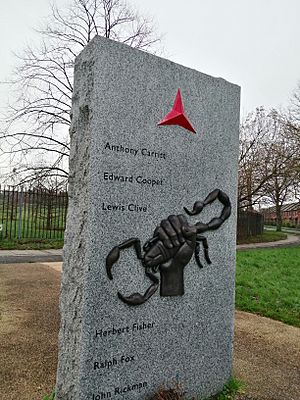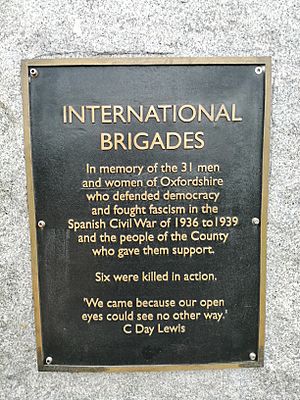Oxford Spanish Civil War memorial facts for kids
Quick facts for kids Oxford Spanish Civil War memorial |
|
|---|---|
| Oxford, England | |
 |
|
| For International Brigades | |
| Unveiled | 10 June 2017 |
| Location |
East Oxford, Headington Hill
|
| Designed by | Charlie Carter |
| Burials by war | |
|
"In memory of the 31 men and women of Oxfordshire who defended democracy and fought fascism in the Spanish Civil War 1936-39 and the people of the County who gave them support. Six were killed in action."
'We came because our open eyes could see no other way.' C Day Lewis |
|
The Oxford Spanish Civil War memorial is a special monument in Oxford, England. It remembers people from the local area who went to Spain to fight in the Spanish Civil War (1936-1939). These brave individuals fought against forces that were supported by leaders like Hitler and Mussolini.
The memorial was built and officially revealed in 2017. You can find it near South Park, at the bottom of Headington Hill. It is close to where Headington Road and Morrell Avenue meet.
Six names of people who died are carved into the front of the memorial:
- Anthony Carritt (1914-1937)
- Edward Cooper (1912-1937)
- Lewis Clive (1910-1938)
- Herbert Fisher (1910-1938)
- Ralph Fox (1900-1936)
- John Rickman (1910-1937)
Contents
Why the Memorial Was Built
Remembering Local Heroes
During the Spanish Civil War, 29 people from Oxfordshire joined groups called the International Brigades. Two others joined a different group called POUM. These groups were made up of volunteers from many countries. They went to Spain to help fight against a type of government called fascism. Fascism is a very strict way of ruling where people have few freedoms.
Many of these volunteers were activists who believed in communism. This is a political idea about how society should be organized. Many also had ties to Jewish communities in Britain.
Oxford's Role in the War
Oxford was a very active place for people who were against fascism. Many groups raised money to help people in Spain. Homes in Oxfordshire even welcomed hundreds of Basque refugee children from Spain.
People in Oxford also actively protested against fascist groups. For example, a person named Abe Lazarus helped students break up fascist meetings.
Many local volunteers who survived the war became important people. They became professors, surgeons, and leaders in human rights or workers' unions.
Famous People from Oxfordshire
Oxfordshire was a key area for people who supported the Spanish Republic. This was the government that the volunteers fought for. Some famous people linked to this cause include:
- Lewis Clive: An Olympic gold medalist.
- Thora Silverthorne: A communist activist and later a Member of Parliament.
- Ralph Winston Fox: A writer who wrote about famous historical figures.
- Alec Wainman: A photographer.
- Baron Milford: The only member of the Communist Party to be in the House of Lords.
- Claud Cockburn: A communist leader.
- Tom Wintringham: A historian who studied Marxism.
- Giles Romilly: A journalist.
How the Memorial Was Planned
Raising Money for the Memorial
In 2014, people started a campaign to raise money. They wanted to build a memorial in Oxford to honor the volunteers. A lot of the money came from selling a book called No Other Way: Oxfordshire and the Spanish Civil War 1936-39. This book was written by local historians.
Other groups also helped with funding. These included political parties like the Labour Party and the Green Party. Workers' unions like Unison and the Trades Union Congress also gave money. Even colleges like Ruskin College and The Queen's College contributed.
Finding a Location: Challenges and Solutions
Finding a place for the memorial was not easy. The Oxford City Council turned down several ideas for locations in the city center. Some councillors, especially from the Liberal Democrats, opposed all the suggested spots.
Other groups also disagreed with the memorial's creation. These included the Oxford Preservation Trust and a local residents' association.
The current location was the third idea proposed. The first idea was Bonn Square. This was rejected because the memorial was made of granite, which is not a stone found naturally in Oxford.
The second idea was St Giles'. This spot was also turned down. Some councillors felt that putting an anti-fascist memorial too close to other war memorials would disrespect those who died in the Second World War. Some people also said the design looked "aggressive." They wanted a memorial that honored "both sides" of the conflict.
One Liberal Democrat councillor, Elizabeth Wade, opposed every location. She said the second idea on St Giles' was "aggressive and triumphalist." She also worried that a monument with a red flag would promote communism. However, no red flag was ever planned for the monument's design.
 | George Robert Carruthers |
 | Patricia Bath |
 | Jan Ernst Matzeliger |
 | Alexander Miles |


